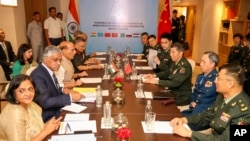India and China disagreed during a meeting of their defense ministers Thursday on the importance of restoring peace along their disputed border to developing bilateral ties.
India called such restoration key to developing the ties, while China sees the border situation as largely stable, the respective governments said in statements issued after the meeting.
The meeting, between Indian Defense Minister Rajnath Singh and his Chinese counterpart, Li Shangfu, was held in New Delhi on the sidelines of the Shanghai Cooperation Organization defense ministers' meeting Friday.
This was the first visit by a Chinese defense minister to India since tensions spiraled after a 2020 border clash that killed 20 Indian and four Chinese soldiers. The defense ministers’ meeting was keenly watched to see if the high-level interaction would help bridge what is called a “trust deficit” between the two countries.
An Indian Defense Ministry statement said Singh had “categorically conveyed that development of relations between India and China is premised on prevalence of peace and tranquility at the borders.”
According to the Indian statement, he reiterated that “violation of existing agreements has eroded the entire basis of bilateral relations and disengagement at the border will logically be followed with de-escalation.”
The Chinese National Defense Ministry said Li had described the situation along the border as “generally stable.” The Chinese statement said “both sides should take a long-term view, place the border issue at an appropriate position in our bilateral relations, and promote the normalization of the border situation as soon as possible.”
Li said that as major neighboring countries the two sides should view bilateral relations and each other's development from a “comprehensive, long-term and strategic perspective and work together to continuously enhance mutual trust between the two militaries.”
India accuses China of intruding into its side of the disputed border in violation of agreements signed since the 1990s. Beijing denies the accusations and blames New Delhi for the transgressions.
Eighteen rounds of negotiations between military commanders of the two countries since the 2020 clash have failed to defuse the tensions, with the latest round of talks ending this week without a breakthrough.
New Delhi analysts said restoring ties between the countries will be a long haul.
“The shadow of what happened in 2020 is not going away quickly. There has been a collapse of trust and you cannot restore it through negotiations and meetings,” Manoj Joshi, distinguished fellow at the Observer Research Foundation in New Delhi, said.
“Normalcy in ties is not going to happen soon because India is not sure what Beijing is trying to achieve,” he said.
He pointed to a clash that took place between Indian and Chinese soldiers in December in Arunachal Pradesh, in which New Delhi had accused Chinese troops of trying to encroach the Line of Actual Control – the countries’ nearly 3,500-kilometer border in the Himalayan mountains.
While both countries have withdrawn soldiers from some of the disputed areas, they still deploy an estimated 60,000 soldiers and advanced weaponry along the frontier. They are also rapidly building infrastructure, including roads and helipads in the mountains.
Analysts have warned of the risk of confrontations between soldiers who are often posted within meters of each other.




